#his actor said the character was but considering how painfully heterosexual the show was i need onscreen confirmation
Text
enterprise is what happens when you let straights write star trek
#star trek enterprise#lord help me i'm back on my bullshit#i'll hunt rick berman to the ends of the earth in a t-shirt saying 'HOSHI AND T'POL ARE ENDGAME FUCK YOU RICK BERMAN' if this breaks 10k#i fully expect it not to of course but i'm workshopping designs as a contingency plan#it might just be a collage of 'THIS VULCAN IS GAY/THIS LINGUIST IS GAY AND THERE'S NOTHING YOU CAN DO ABOUT IT'#with that on the back#and the less said about generic white guy 5 who gave off a gay vibe every now and then but they refused to confirm it the better#his actor said the character was but considering how painfully heterosexual the show was i need onscreen confirmation#that said if i'm ever a writer on a star trek series i'm gonna fucking torch that straightness and canonize this shit myself
2 notes
·
View notes
Text
The Witcher: The Games vs the Books part 2 – Characters and Accents
So, I've already talked at length about the relationship between the Witcher books and games, but how well they captured individual characters is its whole own subject – and you’d better believe I have enough thoughts on it for a whole extra post.
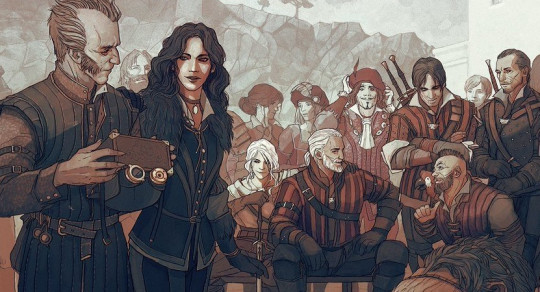
Andrej Sapkowski's skill for creating vivid and engaging characters really is so much of what brings the books to life, and no matter how much work an adaptation might put into worldbuilding and plot, it's the characters you've really got to nail to get the long-time fans on board. Especially when you’ve done what the games have, framing themselves as a direct continuation of Sapkowski's story. Nothing invites comparison to your source material like basically forcing fans to read the original novels to understand even half the backstory alluded to in-game.
So how did they do? I can only offer my opinion – characterisation is necessarily going to be a lot more subjective than just telling you what plot points the games contradicted outright – but like any fan, I have opinions in plenty.
Of the main cast, I feel Yennefer is the character they've captured the best. They've done just as well with some supporting players – I have no real complaints about Dijkstra or Phillipa, for example, who are favourites of mine in both games and books. For the main players though, Geralt and Regis seem to be the ones who's differences I'm most inclined to forgive, whereas I don't feel like they've done Ciri justice at all. Book!Geralt is much less of a smartarse, for one thing, whereas Book!Ciri is much more of one. But if we're talking about the differences, I’m afraid we really need to start with Dandelion.
Dandelion
For all the genuinely good work the games do with characters, old and new, I don't think I can overstate what a disservice the they've done Dandelion, who I could not stand in TW3, but is now one of my favourite book!verse characters. Alas, Dandelion is a prime example of something the Witcher games really don't do well: camp. Being the archtypical bard, Dandelion is about as flamboyant as any enthusiastically-heterosexual man can be: you should be able to spot this guy by body language alone, he should be flouncing around and he should talk like a spoiled noble auditioning for Shakespeare. Book!Dandelion is over-the-top and ridiculous and just so much fun, and I loved him well before I'd even really gotten into the rest of the books around him.
Here's just a bit of dialogue from one of his first appearances, to give you a sense of how he and Geralt play off each other.
The bard seized the fingerboard of his lute and plucked the strings vigorously. ‘How would you prefer it, in verse or in normal speech?’
‘Normal speech.’
‘As you please,’ Dandelion said, not putting his lute down. ‘Listen then, noble gentlemen, to what occurred a week ago near the free town of Barefield. ‘Twas thus, that at the crack of dawn, when the rising sun had barely tinged pink the shrouds of mist hanging pendent above the meadows—’
‘It was supposed to be normal speech,’ Geralt reminded him.
‘Isn’t it? Very well, very well. I understand. Concise, without metaphors. A dragon alighted on the pastures outside Barefield.’
Though TW3's Dandelion certainly looks the part, you have to go hunting through art from the Gwent cards to find much that comes close to really capturing his personality (see left pic below – though even there, a Dandelion who'd voluntarily break his treasured lute is a very hard sell). Though a lot of fanart does better (right-below – credit goes to Tatiana Ortaliz).
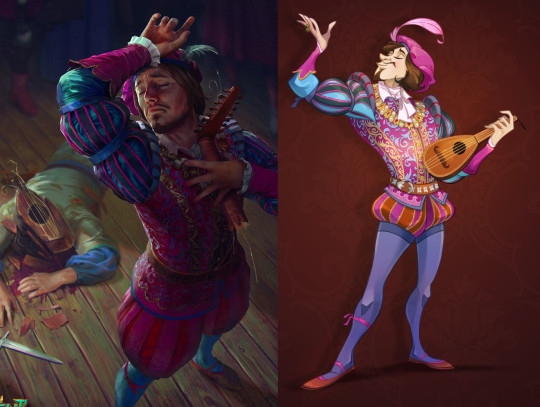
But as poorly as the games capture his flamboyance, they're not that much better when it comes to taking him seriously. TW3 left me thinking he was all talk and no substance; the books make abundantly clear that he really is renowned enough to be welcome in courts across the continent. Though he often overestimates what he can talk himself out of, he isn’t stupid either: he's lectured at Oxenfurt, spied for Dijkstra, and then there are the moments where the frivolous playboy mask slips and you realise he's sometimes much better at understanding people and relationships than Geralt will ever be (which is honestly kind of funny considering how many of Dandelion’s relationships end with plates being thrown at him from an upper story). He's not at all above mocking Geralt when he deserves it either (and especially his personal and relationship issues) – Geralt will happily mock him right back.
We never do learn how they became friends (I'm pretty sure the incident listed in the wiki is just the date of their first expedition together, not their first meeting), but Geralt just doesn't form lasting friendships or romances with anyone he can't have an intelligent conversation with. And Dandelion is a damn good friend to Geralt – one who, despite being a helpless, squishy little bard, will keep Geralt's secrets under torture, or will follow him into Nilfgaard in the middle of a war simply because you don't let a friend make a trip like that alone. (Seriously, I don’t ship it nearly as much as some, but hot damn there is some material in here if you do.) In short, it's basically inconceivable that he'd leave an amnesic Geralt wandering around Vizima alone, as he does in the first Witcher game – which is the kind of thing I can mostly forgive as a gameplay conceit, only it doesn’t really get better from there.
He’s also supposed to be blond, something I don’t think is technically specified until fairly late in the novels, but 100% what I’d been picturing since his first description as a man in a colourful bonnet with cornflower-blue eyes (let’s face it: Dandelion’s hair isn’t the only thing about him that screams ‘blond’). It’s a shame no-one from the games to the show to the novels’ cover artists seem to have noticed – but at least there are some fanartists out there who were paying attention (credit for these goes to Asphaloth, Ghostcupdraws, Hvit-ravn (tumblr deleted), 94355 and itsmespicaa).
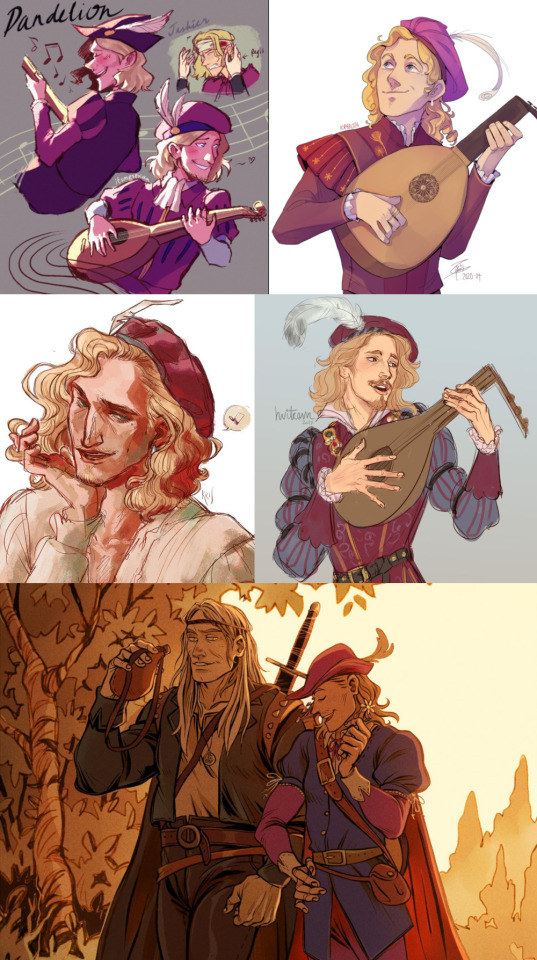
As for the games? Well, I cannot speak to how Dandelion came across in the original Polish, but I think it speaks worlds about the priorities of the English version that they didn’t even bother to cast someone with a halfway-decent singing voice as their master bard. There are isolated moments of dialogue that come close to sounding like book!Dandelion– mostly in Witcher 2, which comes closer to capturing the spirit of the books than either 1 or 3, or his attempts to convince his captor he's a disguised noble when you rescue him TW3 – but his voice actor is just painfully ill-suited to the role.
Geralt
Geralt fares much better than Dandelion, though he’s still a little hard to square with the Geralt of the books. Book!Geralt spends a lot more time sulking, just to begin with: he sulks because his job is complicated and gets him no respect, and because the world is unjust and unfair – and, most of all, he sulks because Yennefer has dumped him again. He also gets mocked for sulking, and usually deserves it. Book!Geralt is generally a lot more taciturn and a less prone to making smart comments just to have something to say – arguably because in book!Geralt's world, making smart comments often ends at the gallows, or at least with some corrupt official making your life much harder. Book!Geralt's world kind of sucks, and he's just got to put up with it.
As much as he often plays into the expectations of being an uneducated monster hunter, he's also got a more of an intellectual streak than you’d guess. He may prefer to stay out of politics (because damnit, his job is to save people from monsters, not people who are monsters), but he attended school at Nenneke's temple and has even taken classes at Oxenfurt academy, and there's a lot of thoughtful nuance to his opinions – his speech to Ciri about why he can't in good conscience take a stronger stance against the Scoiata'el contains a wealth of historical perspective, just for one example. Even his smart comments tend to be, well, somewhat smarter in the books.
Book!Geralt’s explicitly a lot younger than Yennefer – around 50 is the usual estimate, falling far short of the 100-ish the games suggest (the scandal of having a man fall for – gasp! – an older woman clearly didn’t bother Sapkowski one bit). You don’t see nearly as much "I'm getting too old for this" from book!Geralt, who's really not that old by witcher standards, and is apparently still hunting monsters long into his future. I'm also a little annoyed by the way they play off his hatred of portals like he's a grumpy old man who doesn't like mobile phones, when his distrust originally came from having seen the gruesome deaths that result when portals go wrong. This is not to say Book!Geralt lacks other ordinary human flaws, however – twice in the last two books of the main saga, he gets severely sidetracked after his ego gets the better of him (in the adulation he receives after being knighted, then after arriving in Toussaint), and it's quite some time before he properly gets back on track for that whole rescuing-Ciri thing again. He’s also pretty hopeless when it comes to romance and relationships – breaking things off gracefully is really not in his skillset.
So why does game!Geralt not bother me more? Well, he's the main player character of a game franchise, and one who has to carry the experience largely solo. Some adjustments for genre are pretty much inevitable in that position. He's certainly fared better than Meve, for example, who's been softened far more from her book characterisation for her PC role in Thronebreaker. Then there's the whole amnesia thing – it's easy to believe that sort of experience would change a man – and if he doesn't sulk so much as he used to, maybe he's grown up a bit. Geralt's also in many ways the straight-man of Sapkowski's Witcher universe – there largely as the reliable centre for other, louder personalities to play off. But I expect the real bottom line here is that I do still like game!Geralt enough to forgive him a lot of what he lacks.
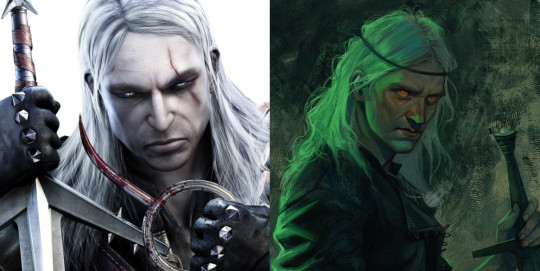
The books never do describe Geralt as being very attractive – something book-based fanart often tries to reflect. The point has been made before that the rather-alien-looking Geralt of the first game (left pic above) is probably a lot closer to his book-description. However, the main distinguishing factor you’ll see in book-based fanart is probably the ubiquitous headband, which genuinely is what book!Geralt wears to make his hair behave (the example on the right above comes from Diana Novich).
All that said, if Sapkowski really wants me to believe that nearly so many women are eager to jump into bed with him, I’m going to have to shallowly assume our witnesses are unreliable on this front, and Geralt is at least as attractive as Witcher 3′s take on him. Nothing else makes sense. *g*
Regis
Regis varies mostly in that book!Regis is a lot more smug, sometimes verging on obnoxious – and a lot keener to make fun of Geralt (who generally deserves it). But then, Regis is old and wise and superpowered enough to dance rings around most everyone else – can you blame him? By Blood and Wine, Regis' overconfidence has been recently smacked down hard after his near-death-experience at the hands of Vilgefortz, and that kind of thing could knock some chips off anyone's shoulder. Throw in the fact that with Dettlaff, we have a situation not even Regis could make light of, and the changes to game!Regis make a certain amount of sense.
I do feel it's a bit of a shame that the vocal direction didn't work just a little bit harder to capture some of Regis' smugger side, or emphasise that his long-winded philosophising on human behaviour is supposed to sound a bit pretentious. This is actually something I suspect they were going for a few times in the script, but which didn't come through in the dialogue quite the way it was meant to. Still, again, I'm sure I'm biased by the fact that I like game!Regis far too much to find much fault in what they've done with him. They've done a lovely job capturing his friendship with Geralt too.
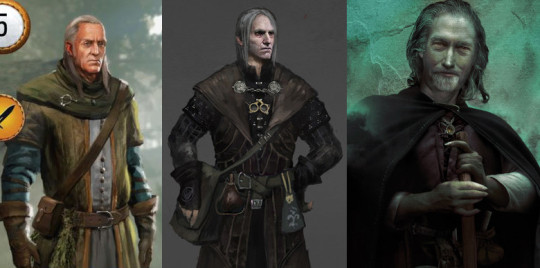
Looks-wise, there's a tendency in book-based art to portray Regis with long hair (even some pre-Blood-and-Wine Gwent art did so – see the two pics on the left above, from Gwent and early B&W concepts. The right-most pic is cover art from the books). I couldn't rightly tell you where long-haired-Regis comes from, though – perhaps it's described more explicitly in the original Polish, or perhaps it comes up in passing in some passage I've forgotten, though it may just as well just be a fannish meme.
The books do describe him as looking rather like a tax collector, slim, middle-aged, with an aquiline nose, prone to wearing black, and his hair as 'greying' or 'grey streaked', so presumably somewhat younger-looking than the game would have it. The hammer-horror-esque sideburns are likewise a game-verse addition, though I do like the look they went with – it's distinct from Geralt in a way that making him another long-grey-haired man wouldn't have been, and that's probably the point.
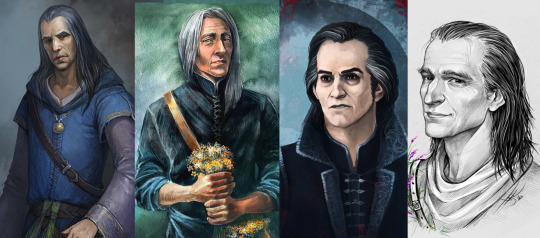
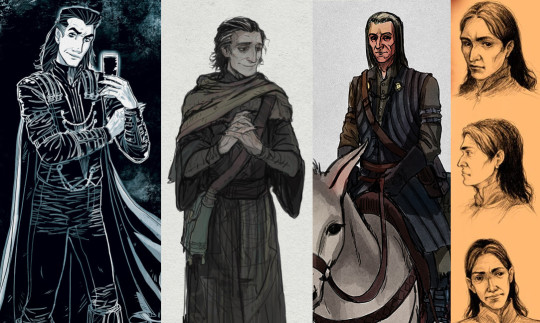
Being the hopeless Regis fan I am, I have quite the folder full of different fanart takes on book!Regis, so have a selection – art here is by gellihana-art, justanor, greysmartwolf, Nastyaskaya, NatalyLanier, beidak, natalliel, ellaine and afternoon63. For what it’s worth, I feel beidak’s (bottom pic, second from the left) comes the closest to what I’d have pictured personally, based on how he’s first described.
Ciri
I find it much harder to rationalise the changes to game!Ciri, who I didn't exactly dislike, but found stuck too close to the role of generic-macguffin-girl-who-just-wants-to-be-normal to be very interesting. Having read the books, not only do I much prefer book!Ciri, I'm not sure I can emphasize enough how much the game did NOT prepare me for utter gauntlet of whump and misery that girl survives in the last four titles. Book!Ciri is a character who works for me mostly because of the same flaws the game mostly strips her free of – TW3 makes some token noise about how you can't tell her what to do, but she’s an utter little royal brat when we first meet book!Ciri, and it’s so much of what brings her to life. She throws herself into her witcher training with the enthusiasm of a kid going completely native, but still revels in getting to be girly for a change when Triss first arrives at Kaer Morhen. She hates Yennefer at first, but soon bonds with her just as strongly as she ever did with Geralt, picking up some of Yennfer’s haughty mannerisms along the way. And then she gets thrown through a portal and lost in the distant wilderness, and the whole world comes down on her head.
The build up to the first time Ciri actually has to kill someone is intense... and things only get worse from there. Steadily. For another couple of novels at a stretch. Seriously, a major caveat that pretty much has to go into any rec for these books (and I will absolutely rec these books) is that Ciri's story gets heavy. So heavy one finds oneself using phrases like, "that time that one guy died of his wounds on top of her while semi-consensually feeling her up was honestly one of the less traumatic incidents in the period."
By the end of the novels, Ciri has nearly died of thirst, been beaten, tied up, dragged around the country as a prisoner, run with bandits and killed innocent people for the fun of it, done fantasy-cocaine and got a tattoo, fought off more than one attempted rape, been drugged, lain for multiple nights next to an impotent elf who completely fails to impregnate her, watched the bodies of her friends and girlfriend being mutilated in front of her, and did I mention where she got that scar? She has survived hell, and it is absolutely a testament to her own strength that she somehow comes through it and puts herself back together at the end. When Geralt finally arrives to rescue her, what matters most isn't that her ordeal is over, but that she finally knows she hasn’t been abandoned by everyone who’d ever loved her after all.
The Ciri of the books is fierce and wild and arrogant, but she's learned her morals from the best, and she holds onto them until she can't, then picks them back up again when she can, and above all she survives. For all that her story turns arguably too much of the last two books into a slog of misery, oh boy does it pay off at the end. And that's probably about as much as I can say about her Big Moment in the last book without spoiling too much, so suffice to say that by the end of the saga, Geralt has pretty much become a supporting character in Ciri's story, not the other way around. (Seriously, you’d be surprised how few chapters of the last two books he’s actually in.)
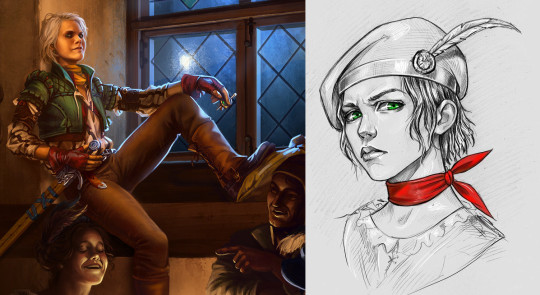
Finding art which captures the aspects of Ciri’s character and history which are missing from the game has turned out to be pretty hard, though the fanart above from her bandit phase takes a decent crack at it (credit to Loles Romero and NastyaSkaya). I do rather like that one shot of her on horseback beside her girlfriend too, which comes from Denis Gordeev’s illustrations for the novels (below).
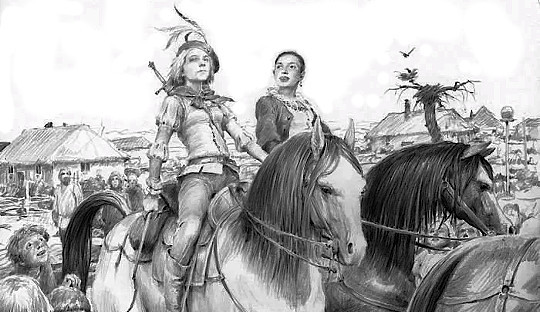
How much of this does TW3 get across with her portrayal in the game? Well, she's still pretty headstrong, I guess. And they let you give a 'sorry, I like girls' answer in one bit of dialogue, so they remembered her girlfriend existed. That's nice. But game!Ciri still has a kind of wide-eyed innocence that book!Ciri lost years ago, while book!Ciri is a little force of nature in ways the games hardly even hint at, and that's a really shameful loss.
You'd think, with a character so young, it ought to be easier to imagine she's simply grown up since we saw her last, but so much of what's changed about Ciri feels like a step back rather than forwards. I can shrug off Geralt and Regis' differences and still enjoy their game-verse-selves, but Ciri leaves me genuinely disappointed.
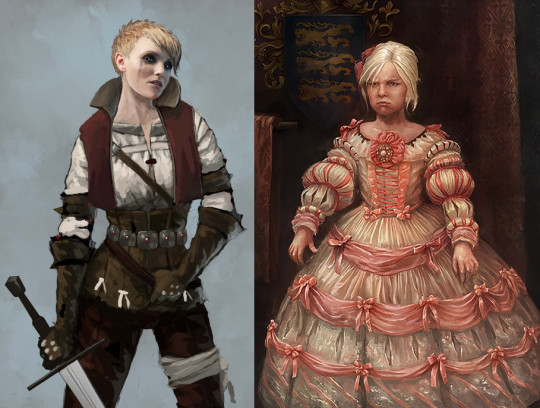
I’d say the official art that comes closest to capturing book!Ciri is that one portrait of her as a very grumpy young child (right above). Some of the early concept art (left above) feels a little more like it has her attitude, though she’s rather too yellow-blonde – not to mention too pretty. I think it also bears pointing out that Ciri isn’t really supposed to be the kind of beauty she is in the game – even before she gets what’s meant to be a seriously ugly and disfiguring scar. (Fanart below by justanor and bobolip)
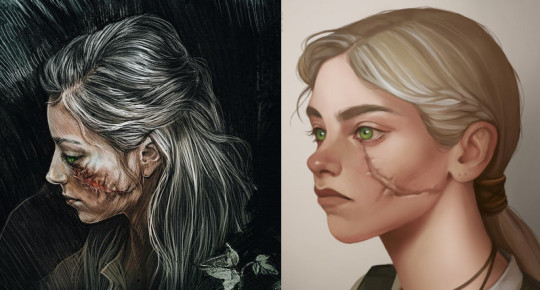
But of course, the male gamer fanbase can’t be expected to give a fuck about a girl they wouldn’t want to fuck, so game!Ciri must be generically gorgeous. Le sigh.
Triss
I suppose I should at least touch on Triss, too, though she's a very odd case. She's so out of character in the first Witcher game that I am wryly amused that the biggest thing they arguably do get right is that taking advantage of Geralt the moment he showed up with amnesia is... pretty well in-character for her (look, I gotta be honest here, I'm not much of a fan of Triss in any of her incarnations).
The second game does a much better job with her – she actually feels like book!Triss, she has some good dialogue, we're finally dealing with some of her conflicted loyalties to the Lodge and to Geralt – though by the third, her characterisation has been so softened into “the nice one” that none of that potentially meaty conflict is ever resolved, or even really mentioned. Perhaps there's more buried in the Triss-romance path, which I've never bothered with, but the writers seem to have just given up on dealing with anything that might make her look less than wholly sympathetic. Heck, we hardly even get a clear statement about why she and Geralt broke up between Witchers 2 and 3.
Even speaking as such a not-a-fan of Triss, I promise there is more they could've done with the character the books give us. There's her ongoing trauma in from the Battle of Sodden, where she was injured so badly she was memorialised as one the dead: the 14th of the hill. There's her furious impatience with the neutrality of both the witchers and the Lodge: Triss has fought and died for a cause, and is ready to do so again. The second game sort of gets into this, but by and large, the games really aren't up to tackling the moral complexity of having such a theoretically-sympathetic character as Triss, who was still broadly willing to go along with the Lodge's plans to pair Ciri off and get her pregnant as soon as possible – her own wishes be damned. No, instead, Triss has conveniently left the Lodge before the rest of them go spiraling into abject villainy in the second game, clearing all that messy grey stuff out of the conflict.
Of course, the really big unresolved plot point still hanging over book!Triss is how badly she needs to terms with the fact Geralt's just Not That Into Her, and never has been – but since the games want Triss to be a serious romantic option, that's definitely not getting the resolution it could've used.
Book!Triss also pointedly avoids any outfit with a plunging neckline because her chest is covered with the ugly scars she received in the Battle of Sodden, something the games did not have the guts to reproduce. In a more confusing note, the books do consistently describe her hair as 'chestnut', which we'd usually think of as meaning 'brown' – though it turns out the games actually may not have been wrong to make her a redhead, since in Poland 'chestnut hair' apparently mean dark red hair (google some pictures of actual chestnuts, and you'll see why). Still, the firy-red-haired Triss of TW3 who wears nothing but plunging necklines remains a bit of a stretch, however you slice it. Once again, TW2 gets her best (and I must say, gave her the nicest outfit) – though even here she's conspicuously unscarred in all her sex scenes.
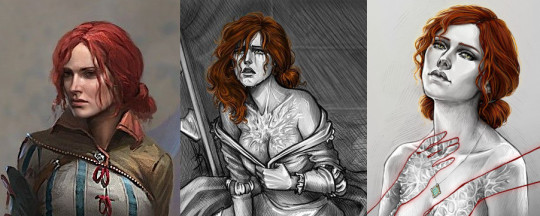
(Leftmost pic above is official Witcher 2 art, whereas Triss-with-scars fanart comes to us – once again – from nastyaskaya)
Shani
Shani sort of falls into a similar category as Triss as someone who isn't terribly well-served by any of her appearances, given that both exist in the first game largely to compete for Geralt's attentions. But I can't honestly say I find Shani’s portrayal in the Hearts of Stone expansion to be much better – the degree to which either version exists solely to fall all over Geralt is a bit painful, especially given that their relationship in the books is limited to a single, undramatic hook-up. Book!Shani really only appears in a couple of chapters: we meet her as a medical student friend of Dandelion's, who's been surreptitiously selling pilfered university supplies to fund her degree, then later see her again in the final book, where she proves herself as a battlefield medic during the climactic Battle of Brenna. She's pragmatic to a fault, and I really can't see her as the type who needs Geralt to point out to her that her patient is dead, for example, or who'd subject a guy with Geralt's problems to such an extended feelings-dump as you'll get out of her during the wedding.
Shani is a reasonably logical book-character to bring back, if only because she’s one of those who explicitly survives the ending, but for my money, "serious contender for Geralt's affections" is just not a role she works in.
Anna Henrietta
The duchess of Toussaint, Anna Henrietta, is another case who differs more from her book counterpart than you might think. In the books, the duchess is by far the least competent of the (pleasantly many and) various female leaders and rulers we meet – she comes across as rather young and naive, and every bit as absurd as everyone else in the ridiculous fairy-tale duchy she rules. She is, for example, most displeased to learn that Nilfgaard's war against the north is ongoing (something her courtiers have carefully avoided mentioning in her presence), because she'd long since sent the Emperor a stern note demanding he brought it to an end. She promptly has one of her ministers sent to the tower for misinforming her, and demands the others prepare an even sterner note for the emperor, which will surely do the job.
After Dandelion (inevitably) cheats on her, she has him repeatedly sent to the gallows, only to change her mind and send him a reprieve at the very last minute each time. Picture yourself a much younger and prettier version of the Queen of Hearts from Alice in Wonderland, and you've about got her general vibe.
Blood and Wine sort of waves at this part of her character when she first speaks about Dandelion, and again in suggesting there's a widespread feeling she lacks compassion, and once more as she proves utterly immovable on the subject of her sister. But the generally sensible and insightful woman you deal with for most of the main story is a far cry from her book-verse characterisation. That’s a bit of a shame, because I feel like there's a lot more they could have done to blend the two versions of her. Still, it’s hard to argue the duchess we get suits the story being told around her.
Other characters
Much as I love Yennefer, Dijkstra and Phillipa, I don't really have much more to say about them because I feel the games have done such a good job. The Yennefer of the books gets to show a lot more depth and complexity simply because she has more scenes and more space in which to do so, but when ‘there isn’t more of her’ is your biggest complaint, the game is officially doing pretty well. I could certainly gripe her about how “dresses in black and white” seems to have been taken as “dresses in black with maybe a trace of white trim”, or how Yennefer and Triss seem to be the only sorceresses in the world capable of wearing pants, when Phillipa (just for one) is in sensible men’s clothing the very first time we meet her, but that’s getting into serious nitpicking territory.
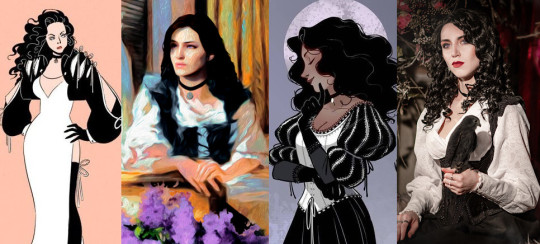
(Not that Yen can’t look amazing in outfits with more white – art by Emily Caroll, theclashofqueens, BarbaraRosiak, and cosplay by greatqueenlina)
Vesimir, Lambert and Eskel, Geralt's fellow witchers from the School of the Wolf, fall into a similar category for me – though we spend far less time with them in the books, everything we see of them in the games feels like a fairly logical extension of their book-roles. Vesimir is somewhat over-played as the old fogey, and his death is painfully cliched, but the impact on the characters and Kaer Morhen still hits home – and the games do some especially great work expanding Lambert into a much more complex character. To my mind, the only shame is that more of the book-original characters didn't get the same treatment.
Who have I missed? There's Avallac'h, of course, but I think I've got him pretty well covered by that last post. Zoltan, perhaps inevitably, has had his personality largely flattened into 'generic dwarf', with nothing better to do than hang around Geralt and Dandelion. You wouldn't know Book!Zoltan was apparently incapable of turning away women and children in need, for example – even human women and children with the chronic inability to say thankyou for his help. Or that he eventually admits to Geralt that the luggage he and his friends are carrying comes from a decidedly unsavoury source for such a supposedly charitable, upstanding guy. Yes, even Zoltan gets to be a morally complicated character in the books – who knew?
Speaking of dwarves, pleased as I am that Yarpen Zigren gets remembered in TW2, he's an odd one to talk about, since even in the books, he appears to have had a substantial personality transplant between his two main appearances. Yarpen’s a largely comedic figure in The Bounds of Reason short story, where he cheerfully admits to having considered letting his men knock down a particularly pompous aristocrat and piss all over him to teach him a lesson, but he’s evolved into a studious voice of reason against the scoiata'el by Blood of Elves. TW2 doesn't do a particularly good job of capturing either version, which I suspect probably bothered me more than most people – I liked the later book-incarnation of Yarpen immensely (and not even just because he's one of few ever to really call Triss out on just how much she needs to stop misreading Geralt's friendship as anything more than it is). His chapter in Blood of Elves packs a hell of a punch.
On the subject of accents
I do have to wonder if I'd have warmed up to characters like Triss, Shani and Dandelion (or even Letho) more if they'd only had halfway decent voice actors. It's not just that none are exactly leading the talent at the acting part of the job, it's that their American accents stick out in TW3 like a sore thumb.
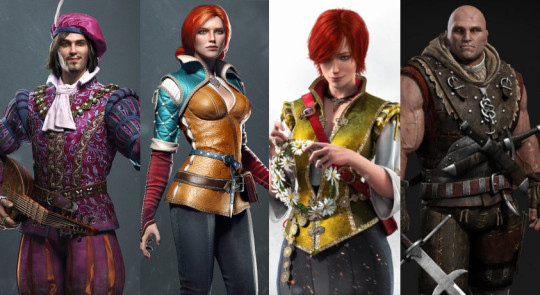
Geralt mostly gets away his own US accent by dint of being the very first character we meet, so we've gotten used to the way he talks long before we notice how he stands out – hell, maybe that's just how they talk down in Rivia (hilariously, book!Geralt eventually reveals he's not even from Rivia, but simply picked the place and taught himself the accent so he could feel a bit less like the abandoned foundling he is, which only gives us yet more excuse for why his accent might sound a bit weird). More importantly, Geralt is meant to stand out, to be the outsider wherever he goes, so having him sound like no-one else fits the character.
But neither Triss or Dandelion are "of Rivia", and by the time they show up we've had dozens of hours in a game where literally everyone else sounds British, or Scottish, or Irish, or vaguely-eastern-European in the case of the Nilfgaardians. So why do these weirdos sound like no-one else on the continent?
The short answer seems to be that every character with an American accent in TW3 is someone who had an American accent in at least one of the previous games, which were way looser with their casting and had enough incidental American accents around that they didn't stand out. Clearly, by TW3, consistency with prior games has been prioritised over consistency with literally anything else we’re hearing.
Gaetan is an exception to the rule as the only new character (at least that I caught) with an American accent – presumably because between Geralt, Eskel, Lambert, Berengar, and Letho (and cohorts), some sort of 'witchers have American accents' rule has been pretty well established (another random American-accented witcher shows up in Thronebreaker, just to underline the point). We're going to mostly ignore Jad Karadin here, since his British accent is presumably a recent affectation to go with his new identity, and so makes sense.
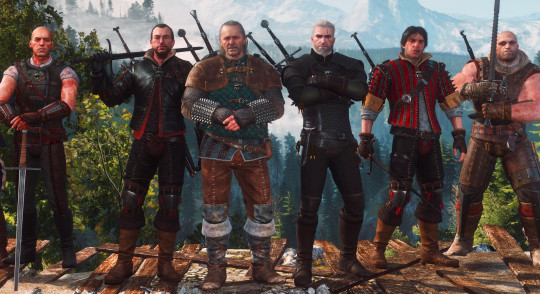
This still doesn't really work though, since Letho’s school is all the way down in Nilfgaard (land of the Eastern European accents), while the oldest witcher from Kaer Morhen (Vesimir) is the one guy with a British accent. He sounds nothing like any of his students, despite the fact he's logically the guy they ought to have learned their accents from. So the logic falls in a heap however you slice it, and I'm thrown right out of the game.
With TW3 as your intro to the series, it feels almost as if characters like Triss and Dandelion have been assigned American accents because they're just too important to be saddled with the same pedestrian British accents as everyone else, which did nothing to endear them to me. The only one I eventually warmed up to was Lambert, and then only because he's just such a bitter asshole that he eventually goes full circle and comes out the other side (somewhere around when you've heard his miserable backstory, then gotten drunk together and told him how much you love him, man). Gaetan similarly snuck in under the same clause – American accents clearly work better for me in this series when attached to characters you're supposed to find pretty insufferable on first impressions.
Some final notes
To conclude, it seems only fair to throw in a quick nod to some of the more memorable book-characters who don't appear in the games. Neither Mother Nenneke (Geralt's sort-of-surrogate mother) or Vissena (Geralt's biological mother) ever appear either, alas – Vissena doesn't even merit so much as a Gwent card, which seems quite the wasted opportunity.
Milva, Cahir and Angouleme – the three remaining companions of Geralt’s who died alongside Regis but who were not so easily resurrected – naturally don’t appear. But nor are even really mentioned in all the games, which seems rather less than they deserve after giving their lives to Geralt's cause.
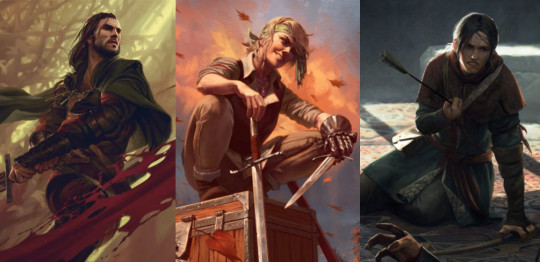
Cahir and Angouleme do at least have pretty badass Gwent cards to their names, though I am properly offended that Milva (who has the dubious honour of being my very favourite book character who doesn't ever appear in the games) is stuck with a card of her freaking death scene – which not only gets the scene wrong (believe me, there was no grimacing and gripping the arrow buried shallowly in her chest for poor Milva), but doesn't even bother to get her hair the right colour, for fuck’s sake. Basically, Milva was a stone cold badass and absolutely deserves better. #justice4milva
One can only guess how I'd have felt about some of these characters had I read the books before playing the games – I am obviously biased towards forgiving changes to characters whom I liked in their game incarnations, regardless of how they compare. Still, I think it does speak wonders that there still all these characters who suddenly made sense only after I'd met them in the books.
Even if only for Dandelion and Ciri, I can only dream of seeing a bit more of the book-original characterisations make it into the collective fannish consciousness. There's nothing wrong with getting into the canon purely based on the show or the games, but having read Sapkowski's novels, it's no longer any mystery how they spawned this massive franchise. That the saga wasn’t even fully available in English until well after Witcher 3 was released – a solid couple of decades late, and long after it had already been translated into Russian, French, German, Spanish and more – is a real shame. For once, it’s us in the anglophone world who’ve been missing out: these books deserve so much more than to be thought of as a footnote to the games or the show.
#Dandelion#Witcher novels#Jaskier#Ciri#Regis#Geralt of Rivia#meta#The Witcher#long post is even longer this time#I blame everyone who gave me such lovely feedback on that last post *g*
72 notes
·
View notes
Text
Deep Breath - Doctor Who blog (New Doctor, Same Bullshit)
(SPOILER WARNING: The following is an in-depth critical analysis. If you haven’t seen this episode yet, you may want to before reading this review)
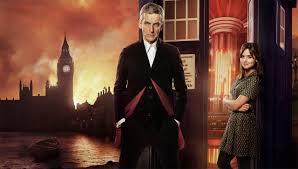
I was very cross going into Deep Breath back in 2014, and before I talk about this episode, I’d like to quickly address all the bullshit that surrounded the buildup to the Twelfth Doctor.
Moffat kept saying how Series 8 was going to represent a brand new direction for the series and that this new Doctor would be so different to any we’ve seen before. He even hinted at the possibility of a female and/or non-white Doctor, saying there was no reason why it couldn’t happen. Who did we end up with? Peter Capaldi! Wow! A middle aged white guy?! Never seen one of those before!
Now before @furrychimp has a go at me, I’ve got nothing against Peter Capaldi. He’s a brilliant actor and I was confident he’d be great in the role. That’s not the issue. The problem I had was that Peter Capaldi was the only actor auditioned for the role. Moffat didn’t even try to think outside the box or look elsewhere. I’m not angry because Capaldi was cast in the role. I’m angry because of the wasted opportunity here. It was a year after the 50th anniversary. A chance to break new ground and try something different, and Moffat didn’t take it. If Moffat knew a non-white, non male Doctor wasn’t on the cards, why in God’s name did he keep banging on about it? It’s like I said in my review of A Good Man Goes To War, he’s more concerned with looking progressive than actually being progressive. Anyone can say there needs to be more diversity or that there needs to be change, but unless someone within the industry actually pulls their finger out and does something about it, those are just empty, meaningless words.
‘Oh but Capaldi is a lot older than previous Doctors.’
Bollocks! He was 55! That’s not old! And besides, we’ve had older Doctors before. He’s not even the first actor to play an older Doctor in New Who, or have we all conveniently forgotten about John Hurt all of a sudden? This is nothing new or original. And while I’m on the subject of his age, good God how fucking patronising were the press at the time? Listening to them, you’d think Capaldi was a 200 year old corpse that had arisen from his tomb and was at risk of collapsing into a pile of bones by the end of the series. The whole obsession with his age was seriously odd on both sides (those who thought this was some kind of cheap novelty and those who thought Capaldi was so weak and frail that he wouldn’t be able to get around the TARDIS without the use of a motorised wheelchair).
And then there’s the promise that the show was going to get a lot darker than it was before, to the point where the BBC pushed the show further back in the schedules so that you knew how dark this was going to get. This isn’t teatime entertainment anymore. It has to be broadcast at 8:00pm because it’s going to be so much daaaaaarker.
Well... we’ve all seen Deep Breath. We all know that was bollocks.
Seriously, how is this any different from an episode in the Matt Smith era? (apart from the fact that Peter Capaldi is less zany and more tolerable than Matt Smith was). It still has the same goofiness and forced whimsey to it (more on that later). In fact some of the humour is actually worse than the Matt Smith era’s. When Madame Vastra tricks the Doctor into forming a psychic link with her so she can put him to sleep, they actually had the fucking nerve to add a comedy cartoon sound effect when he falls unconscious. How fucking desperate can you get?!
But what really strikes me about Deep Breath is how utterly unoriginal it all is. The clockwork robots are back from the overrated Girl In the Fireplace and they’re basically just doing the same shit as they did before only with an extra helping of stupid sprinkled onto them for good measure. ‘Don’t breathe’ is basically the same gimmick as ‘don’t blink’, but whereas ‘don’t blink’ made the Weeping Angels bloody terrifying, ‘don’t breathe’ just makes the clockwork robots laughably inept. A lot of the plot is similar to The Talons Of Weng-Chiang and we’ve seen dinosaurs in London before in Invasion of The Dinosaurs. Not to mention all the lines taken straight from the classic series that Moffat is determined to grind into the dirt (I swear if I hear the ‘you’ve redecorated’ gag one more time, I’m going to scream). Is this what constitutes a brave new direction now? Rehashing plots and concepts from previous stories rather than coming up with your own ideas? Moffat, go stick one of your BAFTAs up your arse. Best place for it as far as I’m concerned.
What’s worse is that this episode has been extended to an hour and 15 minutes, most of which seems to consist of extra scenes of the Paternoster Gang being their usual unfunny selves. At this point it’s not just that they’re boring, underdeveloped and utterly uninteresting characters that bothers me, but also that they are making the Doctor’s universe too small. The man has travelled all across time and space, Surely he must know some other people who would be willing to help him. Why do we keep having to come back to the Paternosters? Strax is still fucking irritating (how can he not tell the difference between an eye and a mouth? Humans and Sontarans aren’t that different. And what was even the fucking point of that medical checkup anyway other than to pad out the runtime?), and I really take issue with how Vastra and Jenny are written. I’ve taken issue with how Moffat presents LGBT characters in his stories before, but this just takes the cake. The episode constantly finds ways to patronise and objectify Jenny while Vastra plays a ‘man with boobs’ type role. And it gets worse when Clara gets involved and we see Vastra start to morph into the predatory lesbian stereotype. Call me picky, but I think we deserve better representation that that. And don’t get me started on that bullshit ‘oxygen share’ kiss. Doctor Who has never been apologetic about two heterosexuals kissing, so why should it treat two homosexuals any differently? It’s just wrong! If they’re open and okay about same sex marriage, why are they being so coy about two lesbian partners being intimate with each other?
So let’s talk about the Twelfth Doctor. Despite my anger and frustration towards the circumstances surrounding his casting, I knew Capaldi would make a great Doctor and he does do a good job in the role for the most part. I liked the stuff at the beginning where the Doctor is really confused and was having memory problems. You could almost draw parallels between him and someone suffering from a memory disorder like Alzheimer’s and it’s genuinely unnerving to see the Doctor in such a high level of distress. I also really liked his final confrontation with the robot and the moral ambiguity of whether or not he pushed him. This is a very different Doctor from Matt Smith and I’m curious to see where they take him (remember I haven’t seen any episodes past Kill The Moon, so I genuinely have no idea what happens to him). Unfortunately all of this is punctured by the usual shit you find in post regeneration episodes. A lot of crazy goofiness and pondering over whether or not this is the same man as before. Admittedly the latter was interesting at first, and The Christmas Invasion did add some dramatic weight to it what with the Doctor being the last of his race and therefore having a more personal connection with Rose than he did with any other companion as a result, but after the twelfth time you’ve done it, you’re just bored by this point. Is the Doctor the same person as before? Er... Kind of. That should be firmly established by now considering the number of bloody times the show has asked this question. Can we move on?
A lot of times I feel Capaldi is scuppered by the humour. He can be a great comedic actor, but this sort of material just doesn’t work with him. It’s too whimsical and eccentric, like the whole sequence with the horse or him calling the dinosaur a big sexy woman. It feels like Moffat is still writing for Matt Smith and it just doesn’t sound right coming out of Capaldi’s mouth. And then there’s the painfully obvious metaphors. There’s a lot you could interpret about the Doctor from what you see on screen. The similarities between him and the robot, and how they both change and replace body parts to the point where you could argue they’re not the same people they originally were. The similarities between him and Vastra, both hiding behind some kind of mask in order to feel accepted. All potentially interesting, but what ruins it is Moffat’s need to fucking spell it out for us. How about crediting your audience with some intelligence?
I really hope Chris Chibnall doesn’t go through all this shit when Jodie Whittaker takes over. In my view, all post regeneration episodes should be like The Eleventh Hour. New body, new personality and then it’s business as usual.
But by far the worst aspect of Deep Breath is Clara. I can understand being worried about the Doctor’s memory problems and state of mind, but that’s clearly not the case at all. Clara is more concerned that the Doctor has gotten visibly older, which is beyond absurd. She’s seen all of the previous Doctors. She’s met the War Doctor. Why should the Twelfth Doctor be a shock to her? Vastra says it’s because the Doctor is no longer young and sexy and, no matter how much Clara tries to deny it, that’s pretty much the only reason I can think of why she’d be angry at the Doctor. I honestly can’t see any other alternative. It doesn’t make any sense why she would be this shocked about the Doctor’s regeneration. At one point she even asks how they change him back. It just makes her come across as really shallow and selfish (not a narcissist or an egomaniac. Seriously Moffat, try browsing a dictionary some time). But what really gets me is that the episode clearly expects you to be on Clara’s side, even going so far as to try to imply that the Doctor is so different now that he has at one point abandoned Clara and left her to die, which I didn’t buy for a second. The First Doctor may well have done that, but he’s a very different man by now. Does she have to stay as the companion? They even wheel out Matt Smith again for yet another goodbye speech to reassure her about Peter Capaldi, which was just plain silly. I suspect the BBC were a little worried that people wouldn’t accept an older, less romantic Doctor. I think the BBC need to have a bit more faith in the audience. May I remind everyone that Doctor Who lasted nearly 30 years without the need to shove in any Doctor/companion romances or snogging and people loved it?
And finally we get Michelle Gomez pissing about in a garden. Who is this mysterious and clearly crazy woman who appears to have intimate knowledge of the Doctor? Gee, it couldn’t be the Master, could it? Oh no! Of course not! The Master is a man! And besides, Moffat would NEVER do a plot twist that bloody obvious.
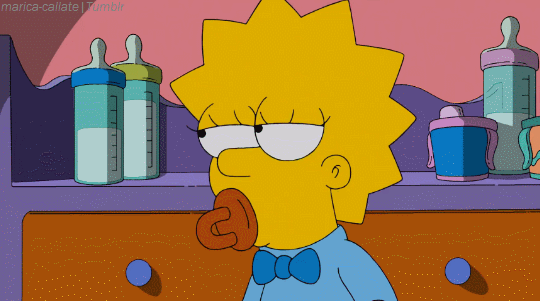
So what is the Promised Land? I don’t know and I don’t really care to tell you the truth. i’ve become so sick and tired of Moffat’s convoluted series arcs and endless intrigue that I honestly can’t even muster up the energy to even be mildly curious about it.
Deep Breath is an uncreative, boring and lazy start to Series 8. That being said, the Twelfth Doctor does show promise. We’ll see where they go from here.
#deep breath#steven moffat#doctor who#twelfth doctor#peter capaldi#clara oswald#jenna coleman#bbc#review#spoilers
13 notes
·
View notes
Text
Okay, this isn’t what I usually post on here, but since this considers a movie I recently added to my blacklist, and has been cluttering my thoughts since I saw it, I figured fuck it, I have to write something about this.
Recently I made the decision to join a group of people online to watch a bootleg recording of the Emoji Movie.
It’s bad.
Shocking, I know, but I mean it. It is bad. Not even funny bad, just bad. As in it exceeded my already low expectations. I set the bar on the ground and it burrowed under it.
I may not ever liveblog this movie (because Jesus Christ, why would I even if I didn’t watch it already), but I will talk about why I felt it was bad.
Spoilers below the cut. Not spoilers for the Emoji Movie (because it really doesn’t deserve a spoiler-free rant(?)), but for other, better animated movies that others have already pointed out that it at least vaguely resembles (namely Wreck-It Ralph and The Lego Movie).
For starters, the overall pacing of this movie is hands-down the worst I’ve ever seen for anything. It literally fucked up the perception of time for the other people who were watching it, myself included. I can’t even find words to describe what terrible pacing this has, or even find an apt comparison for it because it’s just that unbelievably incompetent. There were three writers working on this thing, and it seemed like none of them had a single idea of how basic story flow works.
Speaking of the story, it’s just as dull and confusing of a mess as most people had feared. It has all the trademarks of your formulaic animated kids movie. Male protagonist who doesn’t fit in but wants to change that? Yep. Annoying best friend (who doesn’t act like one in this at all) sidekick that’s supposed to be funny and charming (but in this movie actually isn’t either of those things)? Yeah. Girl character who’s “not your typical girl” who ends up being the love interest to the main protagonist? Oh you better believe that’s there. Main Protagonist does something that puts multiple people in danger and now he and his newfound friends have to go out to save everyone, and in the end he defeats the bad guy and gets to be himself? Oh yes. Bland cishet romance? Duh. Jokes that try to appeal to millennials but fall flat? Definitely. Bathroom jokes? There’s a freaking poop emoji (two, actually), of course there is. Oh, and so much blatant product placement that it’d make an Adam Sandler movie blush.
The internal logic of this movie’s world just doesn’t make sense. In this film, whenever someone wants to use an emoji, that emoji gets scanned, and the ones with expressions have to make and hold the right face while they’re being scanned, and apparently they have to go through this process every time the phone user wants to use an emoji. Why do they need to be re-scanned every time? Wouldn’t it be a lot easier to just take a picture of everyone once and use that? Why do they all have to act “in character” for their whole lives even when they’re not going to be scanned? (You know how the characters in Wreck-It Ralph “break character” once the arcade closes? Yeah, that’s definitely not what happens in this movie; what you see is what you get.) There are animal, food and object emojis in this world, so do they get to have different emotions while others don’t? Emoticons exist in this universe (as elderly people), so what happens if the user wants to send one of those instead of an emoji? The emojis with expressions definitely have parents since at least three of the characters are parents, so how does that even work? If two different emojis have a kid together, what does that kid turn out to be? Are two different emojis even allowed to be together in this fucked up universe? Why do the poop emojis need to use the bathroom?! There are so many questions that this movie raises, and pretty much none of them are answered. I mean, as bad as the Cars films can be with a similar “how is that even possible in this universe” logic problem, even those aren’t quite as in-your-face questionable as the ones this movie brings up. (Plus, there are at least minor attempts at getting around some things in the Cars series, whereas the Emoji Movie doesn’t even try.)
The characters are all pretty much one-dimensional, even the ones that are supposed to be more “complex” than the others. It’d be one thing if they were at least enjoyable to watch, but they’re not. Gene, the main character, is supposed to be someone the audience likes, but the moment that his confession of forced heterosexual feelings “love” for Jailbreak is rejected by her, he leaves both her and High-Five, and while the writers obviously want people to feel bad for him, it comes off as him acting like an asshole just because his spontaneous feelings weren’t reciprocated by the woman he didn’t even know for a whole day (I think it was a day anyway; like I said, the pacing and sense of time in this movie is fucked up). The writers want you to believe that Gene and High-Five are friends, but given that High-Five initially wanted to go with him for selfish purposes (he’s a “loser” emoji who doesn’t get used much at all and thus gets excluded from some kind of after-party thing, which also brings up a lot of questions), and given the lack of any sort of interaction between the two to imply that they’re growing closer as friends, it comes off as completely false and forced. (Also, I know in most animated stuff they record the actors separately, but dear lord, you should not be able to easily tell that the voice actors for the characters interacting with each other on screen were never in the same room together. In this film it’s painfully obvious that High Five’s voice actor had little to no interactions with the other actors because he has so many moments of solo ad-libbing that make no sense and nobody bothered to stop him or leave any of it out despite it not even being funny.) There’s a moment where Gene’s father, Mehl (haha), reveals that he also has more than one emotion but he’s learned to suppress it, and it’s supposed to be emotional, but given that the earlier scenes he had with his wife, Mehry (HAHA), had him blaming her for why Gene is the way he is, it doesn’t quite make up for what he said in those earlier scenes, and in a way seems to make it worse since he knew it was “his fault” yet blamed her for it anyway. At the end of the movie, Jailbreak goes from being a character who ran away to pursue her dream of being more than what she is supposed to be, to... well, love interest. Yeah, she does other stuff, but at the end she’s basically just a love interest for Gene. Oh, and she also rudely brushed off her mom who was no doubt worried sick about her for who knows how long rather than give her any sort of comfort, which doesn’t make her very likable either. Also, the actual humans that exist outside the phone are barely in this, and their subplot is pretty pointless. (It’s also a forced heterosexual subplot too, because one just wasn’t enough I guess.)
You know how one of the biggest rules of writing is “Show, Don’t Tell”? Apparently none of the three writers working on this movie have heard of that, or they have and they completely ignored it, because there is a lot of telling in this movie and not much showing, especially in the opening with Gene narrating for several minutes.
I don’t think any of the writers know anything about how the internet or smartphones work, or anything at all. The child has a disguised “piracy” app on his phone? They think that it’s possible to reverse the deletion process on a phone, while it’s happening no less? (Factory reset? What’s that?) I am pretty sure that they don’t understand that internet trolls are actual people and not a thing the internet itself makes up? The kid calls the store so he can make an “appointment” for his malfunctioning phone instead of just going there? There are several points where the kid with the phone could’ve just turned off or muted his phone, but didn’t because I don’t know?
(Wreck-It Ralph spoilers ahead) There are revelations that come out of nowhere with absolutely no build-up and are poorly timed, and the biggest example of this has to be the scene it’s randomly revealed that Jailbreak is the missing princess emoji that was only briefly brought up one time before that. I knew that this twist was coming due to it being spoiled in other reviews, and I’ve seen badly-handled reveals before, but I’ve never seen it handled this poorly before. Say what you will about Wreck-It Ralph, but the reveal that Vanellope was the actual ruler of Sugar Rush had hints and build-up to it, and it waited until the time was right to confirm that information to the audience, unlike this movie where the reveal is dropped on the audience somewhere in the second act without much if any build-up to it because the writers just threw their hands up into the air and said “Fuck it! I don’t know! Who cares!”
Sir Patrick Stewart as the poop emoji was completely pointless. I don’t think he even got that much screentime, and the only thing they really did with it is a random Star Trek joke that makes zero sense in the context of the movie itself. (He’s sitting in a chair in his “assigned cube” like Picard does in Star Trek TNG, even though none of the other emojis have chairs in their cubes and this reference is just there because... really forced voice actor reference.) Of course that’s not even getting into the fact that there’s a character who is literally sentient feces. I know it seems ridiculous for me to criticize this part since one of my favorite guest characters from Rick and Morty is Fart, but Rick and Morty is already a weird show with side character names that are even weirder than that, the casting of a decently-known actor for that small part made sense (Fart’s very Bowie-inspired, and Clement is well known for his “rough impersonation” of Bowie), and wasn’t just “we got this well-acclaimed actor to voice a literal turd; that’s the joke”. Plus, at least the writers of Rick and Morty can at least, you know, write characters and a story.
Speaking of characters, there’s something I find unsettling about how the women in this movie are portrayed. Jailbreak starts off as a character with a goal to make it to The Cloud (literally shown as a cloud, of course), but by the end of the movie it seems she completely gave up that dream because she fell victim to the writers’ need to make her a heterosexual love interest to the boring male protagonist for no reason realized she loved Gene for no reason. Gene’s mother, Mehry, is the only one in the family who doesn’t have any “unusual emotions”, while her son and husband do. The only human girl in the real world that I know has a name is just a love interest (though to be fair, the rest of the human characters aren’t very well defined either). The only female character in the cast who isn’t a love interest is the villain, and she’s clearly meant to be an unlikable bitch who wants people to either conform or die. All of the characters are written badly, but something about how these writers portrayed their female characters really doesn’t sit well with me. I doubt this was intentional (at least I really hope it wasn’t), but still.
Like I said, the product placement in this movie is horribly blatant, with probably the most painful example being Candy Crush (which is now adding Emoji Movie levels). I’ve heard that someone in charge of production said that the apps shown in this were going to be shown front and center in this movie, but christ. You’d think that maybe there would be some creativity as to how these apps look and work inside the phone from the perspective of a character who exists inside it, but... no, not really. Hell, the Candy Crush app just made me think of Sugar Rush from Wreck-It Ralph and remind me of how much better that movie is in comparison. Or lots of other movies, for that matter.
(Wreck-It Ralph and LEGO Movie spoilers ahead, and possibly Inside Out too) Speaking of which, early on people were already crying “ripoff” because the basic premise already sounded so similar to that of Wreck-It Ralph (only it’s a phone rather than video games), LEGO Movie (at the very least with Jailbreak resembling Wyldstyle), and Inside Out. I haven’t seen the latter film (yet), but I can say that the accusations about it ripping off the other two aren’t far off. For starters, the basic premise is similar to The LEGO Movie (male protagonist goes on an adventure with his newfound funny friends and eventual love interest and saves the world from a bad guy), with some elements of Wreck-It Ralph mixed in (set inside something humans play with, protagonist is treated differently from others but learns to believe in himself, his newfound friend doesn’t fit in either, one friend turns out to be royalty, in a way it even kinda rips off how the opening was narrated by the main protagonist). However, what made Wreck-It Ralph and The LEGO Movie both more successful than this one (among multiple other things) was that they actually did something with their settings and plot, and they featured characters that were written so that people would want to see them succeed. Emmet’s relatable because there are people who don’t think they’re special or talented in a world where everybody else is. Ralph is relatable because there are people who are judged for what they do for a living without knowing them on a more personal level. We’re supposed to like Gene because... well, because the movie said so. Yeah, he’s different, but unlike Ralph and Emmet, there’s no sense of charm or wit to him (or anyone else in this movie, for that matter). What it also lacks that the other two have (again, among many other things) is heart, and at least some subtle forms of creativity. I can tell that the people who worked behind both of those movies had fun with what they were doing and believed in it. The Emoji Movie just... doesn’t. It feels like cheap, poorly-handled advertisement first and a movie dead last. I couldn’t think of anything I saw in it that didn’t make me think of something else that handled it better.
Also, this has nothing to do with the movie itself, but I’ve come to hate the people who use the “kids might like it” argument to justify this movie’s existence. Kids deserve better than movies like this, and in this day and age there’s plenty of things that kids would like that have more respect for their intelligence than this movie does.
This, however, I will blame the movie for: the people behind it have been shown saying stuff like “it has a good message” and it’s “feminist,” but it’s all just blatant lies; nothing about this movie is progressive or has a good, well thought-out message in general. I’ve heard men who hate this movie claim that the “feminism” in this movie is forced, and it is, just not in the way they say it is (considering they usually imply that feminism in general is bad and unnecessary). Look, Wonder Woman (as a comic book series and a character; I haven’t seen the movie yet) is feminist; the Emoji Movie is not. The Emoji Movie is trying to disguise itself as feminist (or rather what some doofuses think feminism is) as a tactic to get people to see it because that’s what people these days want to see, and the execution makes it obvious that they don’t really care about actually being feminist or even understand what it means. One person in the stream said that one of the creators claimed that Gene’s inability to handle just having one single emotion and his dad’s suppressed multiple emotions was supposed to be a metaphor about being gay (though I found it to be more akin to being a metaphor about being neurodivergent), but if that’s supposed to be true, then why not just actually make Gene gay? (Not like anybody in the LGBT+ and/or neurodivergent community would want to be associated with this garbage movie; I’m bi and autistic and I know I wouldn’t.) I honestly think that they just said it so that they could sucker people into seeing it. In fact, that’s how it seems to be for all the other “good messages” it wants to send as well: they say they’re there, but they’re just saying it because they know that’s part of what sells these days, and they think that if they just say that then people will give it their attention and money, and I honestly find that despicable.
In short, this movie offers nothing to most everyone (I say “most” only because this could be used as an example of how not to make a good movie), and the people who green-lit this should be embarrassed. I know some people want to see it ironically, but please don’t go out and see it, especially not in theaters. It’s not worth your time, and especially not worth your money.
18 notes
·
View notes